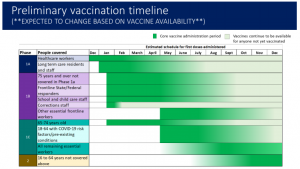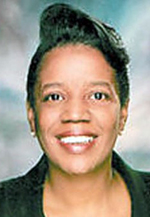Four-year terms headline MAC’s legislative priorities for year
 A state law authorizing four-year terms for county commissioners tops the legislative priorities list issued by the Michigan Association of Counties this week.
A state law authorizing four-year terms for county commissioners tops the legislative priorities list issued by the Michigan Association of Counties this week.
“We made it further than we ever have in Lansing on 4-year terms in the 100th Legislature,” said Deena Bosworth, director of governmental affairs, “so we enter the 101st Legislature with optimism that we will succeed now.”
Michigan is among just five states with two-year terms on all commissioners. As MAC Board Member Jim Storey of Allegan County testified before the last Legislature, “As the scope of services has expanded and deepened, the tasks expected of commissioners have also grown. When Boards of Supervisors were the norm, the primary task was adopting an annual budget and ensuring tax collection. … In short, the administrative-legislative function exercised by county government, as the Citizens Research Council observed, is far more complex and detailed than when Michigan’s founders set up our current system of local government.”
Other goals for the year are:
- Enacting Reforms to Improve the Functioning of Local Courts
- Bolstering Michigan’s System of Financing Local Government
- Ensuring the State Covers Costs for Property Tax Exemptions
- Adopting Measures to Reverse Damage Inflicted by “Dark Stores”
- Addressing Roads, Underground Infrastructure and Threats to Michigan’s Waters and Shorelines
- Bolstering Michigan’s Human Services Programs
Once bills are “dropped” with the Legislature for work in these areas, MAC will be issuing a list of Action Items and digital advocacy campaigns for members to use in contacting their lawmakers.
Annual priorities are developed in accordance with MAC’s policy platforms. For more information on MAC’s policy plans, contact Deena Bosworth at bosworth@micounties.org.
State releases ‘dine safely’ guide in advance of Feb. 1 restart for indoor dining
 The Michigan Department of Health and Human Services (MDHHS) released its next epidemic order which will go into effect on Monday, Feb. 1 and will last three weeks, until Sunday, Feb. 21, which includes provisions for indoor dining.
The Michigan Department of Health and Human Services (MDHHS) released its next epidemic order which will go into effect on Monday, Feb. 1 and will last three weeks, until Sunday, Feb. 21, which includes provisions for indoor dining.
In addition to dining indoors with certain restrictions, the order allows for concessions at casinos, movie theaters and stadiums; personal services requiring mask removal; and non-residential gatherings of up to 10 people from two households.
See links below for additional details and resources:
- January 22 – Gatherings and Face Mask Order
- Gathering Guidelines infographic
- Dine Safely Guide
- Stay Safe & Healthy in the Pandemic Guide
- Indoor Dining Guidelines Infographic
As always, visit MAC’s COVID-19 Resources Page for the latest news.
MAC policy committees staffed with members from 44 counties
 MAC’s six policy committees will have members from at least 44 of Michigan’s 83 counties after MAC Board President Veronica Klinefelt of Macomb County approved appointments for 2021 this week.
MAC’s six policy committees will have members from at least 44 of Michigan’s 83 counties after MAC Board President Veronica Klinefelt of Macomb County approved appointments for 2021 this week.
“The level of participation in the committees this year is inspiring,” said Deena Bosworth, MAC’s director of governmental affairs. “We have a diverse group of commissioners representing all regions of our state. This level of engagement is essential for us to effectively represent county interests in Lansing.”
All committees will meet virtually for the first half of 2021, while MAC considers whether to make virtual sessions permanent.
Committee sessions start at the end of January with our Judiciary Committee. All others will begin in February. Visit MAC’s digital events calendar for dates and times.
Committee meetings are designed to brief members on key issues, discuss pending legislation and, of course, prep changes to the association’s policy platforms for review by the MAC Board in June and by membership at the Annual Conference. Committees generally meet between February and May and September and October.
For more information on committee work, contact Deena Bosworth at bosworth@micounties.org.
Legislature unveils new committee assignments
 Legislative committees were announced this week by the 101st Legislature.
Legislative committees were announced this week by the 101st Legislature.
The House is currently divided between 58 Republicans and 52 Democrats. Members serving on the House Appropriations Committee, led by Rep. Thomas Albert (R-Kent), include seven former county commissioners, included a former MAC Board president, Rep. Ken Borton (R-Otsego).
Chairing the committee on Local Government and Municipal Finance is Ionia’s Rep. Julie Calley (R-Ionia). Calley is a former Ionia County commissioner. Rep. Robert Bezotte (R-Livingston) will serve as vice chair of the committee in his first year elected to the House, with Rep. Jim Ellison (D-Oakland) as minority vice chair.
Rep. Graham Filler (R-Clinton) will maintain his post on the Judiciary Committee. Rep. David LaGrand (D-Kent) will stay as the minority vice chair.
Rep. Jim Lilly (R-Oakland) will lead Rules and Competitiveness as chair, with Rep. Sarah Anthony (D-Ingham) as minority vice chair.
Other notable policy committee chairs include:
- Health Policy – Rep. Bronna Kahle (R-Lenawee)
- Elections and Ethics – Rep. Ann Bollin (R-Livingston)
- Natural Resources and Outdoor Recreation – Rep. Gary Howell (R-Lapeer)
- Tax Policy – Rep. Matt Hall (R-Calhoun)
- Transportation -Rep. Jack O’Malley (R-Benzie)
The full committee list can be found here.
Serving as lead to the General Government subcommittee, charged with budgeting revenue sharing each year, is Rep. Greg VanWoerkom (R-Muskegon). The new appropriations subcommittee list can be found here.
Senate announced earlier this year some policy committee changes, including Sen. Roger Victory (R-Ottawa) as chair of the Judiciary Committee, replacing Peter Lucido, who left for the post as Macomb County prosecutor. Senate appropriations subcommittees are expected to be announced next week.
The Senate is split 20-16 in favor of Republicans, with two vacancies to be filled later this year.
The legislative chambers are finishing their organizational work in advance of Gov. Gretchen Whitmer’s State of the State address on Jan. 27 and her fiscal 2022 budget proposal in early February.
Whitmer plan would spend $5.6 billion
 At a press conference held Tuesday afternoon, Gov. Gretchen Whitmer unveiled a COVID Recovery Plan that outlines $5.6 billion in overall spending, including a request to use about $274 million from the state’s General Fund, which the Legislature would have to approve.
At a press conference held Tuesday afternoon, Gov. Gretchen Whitmer unveiled a COVID Recovery Plan that outlines $5.6 billion in overall spending, including a request to use about $274 million from the state’s General Fund, which the Legislature would have to approve.
The spending boost would come from three buckets:
- $274 million from the General Fund, bolstered by stronger than expected revenues in recent months
- $309 million from the state School Aid Fund,
- $5 billion in federal funds coming from COVID-19 relief packages
During the Q&A portion of the event, the governor said it would take two years to each vaccination goals based on the present pace, though she is confident the incoming Biden administration will accelerate the delivery of more vaccines.
NACo resets Legislative Conference to virtual events in March
 Registration is now open for the 2021 National Association of Counties (NACo) Legislative Conference. The event will take place virtually over several days throughout March, with bonus content throughout April. Check out the schedule overview and visit NACo.org/Leg for the latest updates and speaker additions.
Registration is now open for the 2021 National Association of Counties (NACo) Legislative Conference. The event will take place virtually over several days throughout March, with bonus content throughout April. Check out the schedule overview and visit NACo.org/Leg for the latest updates and speaker additions.
- March 8-12: Policy Steering Committee Week
- March 17-19: Governance Meetings
- March 24-26: Workshops & Seminars
- March 31-April 1: CIO Forum
Michigan gets $363 million in federal aid for broadband work
 Michigan will get almost $363 million in federal funding over the next 10 years to expand broadband access to 249,263 sites statewide, officials of the Michigan Economic Development Corp. announced.
Michigan will get almost $363 million in federal funding over the next 10 years to expand broadband access to 249,263 sites statewide, officials of the Michigan Economic Development Corp. announced.
The funding is being awarded through the Federal Communications Commission (FCC) Rural Digital Opportunity Fund Phase 1 auction.
Counties and municipalities continue to be excluded from participating in the granting process to help solve the longstanding rural broadband accessibility. However, the full list of company awards can be found here.
Additionally, the interactive broadband map from Connected Nation Michigan is excellent tool if you want to see what parts of the state receive internet service and the type of service provided.
Webinars aimed at jail, public safety practices
 County leaders are invited to participate in two upcoming webinars on jail and public safety practices in Michigan, offered by Wayne State University’s Center for Behavioral Health and Justice.
County leaders are invited to participate in two upcoming webinars on jail and public safety practices in Michigan, offered by Wayne State University’s Center for Behavioral Health and Justice.
Mitigating COVID-19 in Jail Settings Community of Practice Webinar – Jail Policies and Procedures for COVID-19 and Beyond
Thursday, Jan. 28, 2021, 1 p.m. to 2 p.m.
COVID-19 Mitigation Strategies in Jail Settings Community of Practice webinar is the second of a monthly series that aims to contribute to the mitigation of COVID-19 in jail and other incarceration settings. The January event will provide an overview of jail facilities, especially for public health professionals to learn more about general and COVID-19 specific jail facility processes and policies and will feature facilitated discussions with stakeholders from across the country while highlighting COVID-19 mitigation strategies in jail settings with key personnel. To learn more about the COVID-19 Mitigation Strategies in Jail Settings, visit the toolkit.
Juvenile Justice in Michigan: What’s Next?
Thursday, Feb. 11, 2021, 1 p.m. to 2:30 p.m.
In 2020, the National Juvenile Defender Center issued the report “Overdue for Justice: An Assessment of Access to and Quality of Juvenile Defense Counsel in Michigan.” Join us as we discuss the report findings, the landscape of juvenile defense in our state, system reform priorities, and next steps toward improving access to justice for Michigan’s children.
This event is hosted by the State Appellate Defender Office (SADO) and is proudly co-sponsored by the Center for Behavioral Health and Justice.
 Staff picks
Staff picks
- The Supreme Court decision that saved the states billions (Governing magazine)
- 10 animal Twitter accounts that will improve your life (outsideonline.com)
- Michigan among 16 states showing population decline in census estimates (Route Fifty)
- Majorities say they don’t have enough information about when, where to get COVID-19 vaccine (Kaiser Family Foundation)
State expands vaccination eligibility; fewer than 500,000 vaccinated so far
 State leaders announced this week an expansion of the vaccination effort against the COVID-19 pandemic.
State leaders announced this week an expansion of the vaccination effort against the COVID-19 pandemic.
The state has moved to phase 1B of distribution, which includes individuals 65+, teachers, local frontline workers and jail staff. The state has given county health departments the approval to start scheduling phase 1B vaccinations beginning Monday, Jan 11. Due to limited vaccine availability and cold chain storage restrictions, not all health departments are able to begin vaccinating phase 1B eligible individuals on Monday. Information on the process and to determine if your local health department is scheduling individuals eligible for phase 1B vaccination can be found here.
To date, 80 percent of deaths due to COVID have occurred among those age 65 and older. Michigan has administered more than 150,000 doses of the 700,000 vaccines shipped.
Many health departments are reporting uncertainty on when more vaccines will become available and growing concerns to identify and schedule those who may not have the tools to navigate an online appointment system. The governor has seen criticism on the numbers as reports show Michigan 11th in the nation when it comes to total vaccines administered, yet a joint letter from a coalition of governors was sent to federal officials this week requesting a release of more vaccines as the roll out grows to more eligible recipients.
County commissioners should ensure they have the most up-to-date information from their local health directors to share with constituents.
For more information on this issue, contact Meghann Keit at keit@micounties.org.
Whitmer signs stack of bills spurred by county-state jail task force
 A huge legislative package of reforms suggested by a joint county-state task force on jail policies was signed into law recently by Gov. Gretchen Whitmer.
A huge legislative package of reforms suggested by a joint county-state task force on jail policies was signed into law recently by Gov. Gretchen Whitmer.
The laws are the product of months of input from around the state and legislative work from the Joint Task Force on Jail and Pretrial Incarceration.
Among the bills signed into law were Senate Bills 1046-1051, House Bills 5844 and 5854-57 and HB 5846.
MAC largely supported all these measures but was neutral on SBs 1046 and 1048.
While MAC applauds the progress made in 2020, we support further legislative efforts to act on recommendations pertaining to behavioral health in our jails. State support for mental health diversion, screening tools and increased financial resources is greatly needed to serve this jail population.
For more information on this issue, contact Meghann Keit at keit@micounities.org.
Whitmer lets automation tax break bills expire
 A push by the retail giant Meijer for a sales, use and Personal Property Tax (PPT) exemption for large retailers who are installing and utilizing automation equipment to assist with their distribution systems failed this week after the clock ran out for Gov. Gretchen Whitmer to sign it, thereby creating a “pocket vote.”
A push by the retail giant Meijer for a sales, use and Personal Property Tax (PPT) exemption for large retailers who are installing and utilizing automation equipment to assist with their distribution systems failed this week after the clock ran out for Gov. Gretchen Whitmer to sign it, thereby creating a “pocket vote.”
Senate Bills 1149-1150 and 1153 sought to exempt property, advocates said, that is industrial in nature and the same types of exemptions enjoyed by those same types of companies located in the state’s renaissance zones. They also claimed the automation equipment does not reduce jobs because these employees are redeployed into other areas of their company or they retire. MAC disagreed with those claims, opposed the bills and urged the governor to reject the legislation.
For more information on this issue, contact Deena Bosworth at bosworth@micounties.org.
 Solar equipment tax bill rejected by governor
Solar equipment tax bill rejected by governor
Legislation to exempt solar equipment from ad valorem property taxes and replace the levy with a payment in lieu of taxes (PILT) system was vetoed by Gov. Gretchen Whitmer. Although a PILT system, as opposed to a valuation and depreciation model, has its merits, MAC opposed the bills and urged the governor to reject the legislation. MAC expects the policy discussion will resume later in 2021.
For more information on this issue, contact Deena Bosworth at bosworth@micounties.org.
 Legislative chambers release session calendars for 2021
Legislative chambers release session calendars for 2021
The Michigan House of Representatives and Senate have released their session schedules for 2021.
The 110-member House has identified 100 days as session days. The 38-member Senate has only released a schedule through June, which calls for 65 session days by June 30.
The National Conference of State Legislatures rates Michigan’s as one of four “green” bodies among the 50 states, meaning they are “full-time, well-paid” and with a “large staff.” The other “green” legislatures are in California, New York and Pennsylvania.
Michigan also is one of just 11 states that have no limits on the number of session days.
FAA sponsoring drone session on Jan. 14
 County officials are invited to attend a kickoff meeting led by the Federal Aviation Administration (FAA) on new rules governing the use of drones.
County officials are invited to attend a kickoff meeting led by the Federal Aviation Administration (FAA) on new rules governing the use of drones.
The FAA’s Unmanned Aircraft Systems (UAS) Office of Safety and Integration is launching a UAS local government networking group with the first session on Jan. 14, 2021, from 3 p.m. to 4:30 p.m. EST, with a 30-minute virtual social to follow. There is no cost to attend this virtual event.
If you are interested, contact Diana Robinson of the FAA at diana.robinson@faa.gov.
>
Ottawa’s Vanderberg earns national honor
 Ottawa County Administrator Al Vanderberg was recently named a recipient of the 2020 Engaging Local Government Leaders Traeger Award, which recognizes the 100 top local government influencers in the nation.
Ottawa County Administrator Al Vanderberg was recently named a recipient of the 2020 Engaging Local Government Leaders Traeger Award, which recognizes the 100 top local government influencers in the nation.
In the nomination statement for him, Vanderberg was described “a top influencer. Not only does he work tirelessly for what’s best for Ottawa County, but places a high premium on training staff and helping emerging leaders fulfill their utmost potential. He also serves as a role model and a leader for his colleagues across the country. He’s not afraid to try innovative things while consistently keeping top of mind the goal of ensuring the county is serving its citizens.”
The awards are given by Engaging Local Government Leaders (ELGL, an “accidental professional association” that began in Portland, Ore., in 2012 with a 16-member dinner group. Focused on all levels of local government (from analysts to mayors; librarians to planners; and everyone in between), ELGL’s mission is to engage the brightest minds in local government by providing timely and relevant content through podcasts, blogs, webinars, social media and conference gathering, with the objective of fostering authentic and meaningful connections that are grounded in practices of equity and inclusion.
Counties can apply for federal rental assistance funds
 The U.S. Treasury just released information for the new $25 billion emergency rental assistance program authorized under the year-end COVID-19 relief and omnibus spending package, the National Association of Counties reported this week. Under the legislation, counties with populations above 200,000 residents are eligible to receive direct payments from the U.S. Treasury. Other counties may receive an allocation from their state, similar to the original CRF program under the CARES Act.
The U.S. Treasury just released information for the new $25 billion emergency rental assistance program authorized under the year-end COVID-19 relief and omnibus spending package, the National Association of Counties reported this week. Under the legislation, counties with populations above 200,000 residents are eligible to receive direct payments from the U.S. Treasury. Other counties may receive an allocation from their state, similar to the original CRF program under the CARES Act.
This is Treasury’s new rental assistance webpage that provides information directly from the U.S. Treasury on the new program. This link will take eligible recipients to the submission process for receiving funds. The deadline to submit is Jan. 12, 2021.
Video of workplace safety seminar available to counties
 A recording of a Dec. 17, 2020, webinar on workplace safety co-sponsored by MAC and its CoPro+ procurement subsidiary is now available to all county members.
A recording of a Dec. 17, 2020, webinar on workplace safety co-sponsored by MAC and its CoPro+ procurement subsidiary is now available to all county members.
CoPro+ and SPACE have been awarded a contract that can be accessed by MAC members for the purchase of hand sanitizers, plexiglass dividers and Anew Facility Armor, powered by the BioprotectUS system.
 Staff picks
Staff picks
- New law aims to help localities shift to ‘.gov’ web addresses (RouteFifty)
- Prehistoric human remains found along shoreline at Sleeping Bear Dunes (MLive)
- Medicaid and Continuity of Coverage for the Justice-Involved Population: An Assessment of Select Michigan Counties and Jails (Wayne State University)
- Michigan gravel industry to again try to limit local control on mining (Bridge Magazine)
Further OMA changes expected by end of year
 With the House session delayed due to COVID positive cases (see below), a bill to extend the “no reason” option for virtual local board meetings remains stuck on the House floor.
With the House session delayed due to COVID positive cases (see below), a bill to extend the “no reason” option for virtual local board meetings remains stuck on the House floor.
House Bill 6207, by Rep. Luke Meerman (R-Ottawa), awaits further action. However, the Senate was able to meet, so Senate Bill 1246, by Sen. Lana Theis (R-Livingston), could gain traction. SB 1246 is identical to HB 6207 in that it extends the ability for local boards to meet remotely, for any reason, through March 31, 2021.
After March 31, 2021, remote meetings could be held if a local emergency is declared or to accommodate a member that has a medical condition that would put them at risk during an in-person meeting. The medical condition exception only applies to that individual member for remote ability- not the entire body. (See MAC’s COVID resources page for a link to a state of emergency resolution template developed by the Lansing firm of Cohl, Stoker and Toskey.)
The bill would also accommodate local jurisdictions that must pass an ordinance of local emergency. For county boards, a declaration can still be made pursuant to current law as allowed under the Emergency Management Act.
The legislation is expected to get to the governor’s desk before the end of the year. Gov. Gretchen Whitmer is expected to sign it.
For questions, contact Meghann Keit at keit@micounties.org.
Medical officer outlines Michigan’s plan on vaccines

Gov. Gretchen Whitmer addresses the media as Dr. Joneigh Khaldun looks on in this Detroit Free Press photo.
Michigan’s chief medical executive, Dr. Joneigh Khaldun, outlined the state’s vaccination plan this week, pending federal decisions. In addition, Khaldun and Gov. Gretchen Whitmer announced a bipartisan commission to educate Michiganders on the COVID-19 vaccine.
Interested candidates can apply for the commission by clicking here and selecting “Protect Michigan Commission” from the dropdown menu of the application. The deadline to apply is Dec. 28.
The vaccine will be deployed in phases beginning with health care providers and those in long-term care facilities. Essential workers, such as educators, police and fire, follow, as well as adults 65 and older or with high-risk medical conditions.
Earlier this month, Robert Gordon, director of the Michigan Department of Health and Human Services, told a legislative committee there is no plan to mandate a vaccine.
With a goal of 70 percent of Michigan adults vaccinated by the end of 2021, the administration of the vaccine will be a collaborative effort with hospitals, local health departments and the Michigan National Guard. Allocations are pending federal approval and manufacturing ability, but vaccinations are expected to begin before the end of this year.
The full presentation can be found here.
For questions on the vaccine, please call the COVID-19 Hotline at 888-535-6136 or email COVID19@michigan.gov.
COVID cases prompt cancellations of House activities
 The Michigan House of Representatives largely ground to a halt this week as additional COVID-19 cases and exposures were reported around House members and staff.
The Michigan House of Representatives largely ground to a halt this week as additional COVID-19 cases and exposures were reported around House members and staff.
As it stands, the House has just three scheduled session days left next week before the end of the 2019-2020 term.
Eight members of the state House and 21 staffers are reported to have tested positive so far this year. The Senate has reported three of its members and 16 of its staff have had COVID-19, for a total of 11 elected members and 37 legislative staffers who have confirmed they’ve had COVID-19.
As of Friday, MAC presumes the House will return to normal operations for Tuesday, Dec. 15. It is not clear if the delays of the past week will lead the Legislature to remain in session well into late December.
Podcast 83 continues ‘lame duck’ episodes
 MAC Executive Director Stephan Currie led the Podcast 83 team through a review of legislative activity as 2020 comes to a close in the latest episode of Podcast 83 on Dec. 7.
MAC Executive Director Stephan Currie led the Podcast 83 team through a review of legislative activity as 2020 comes to a close in the latest episode of Podcast 83 on Dec. 7.
MAC advocates Deena Bosworth and Meghann Keit detailed their work on further changes to the Open Meetings Act on allowing remote sessions, changes to property tax collections and news out of Washington, D.C., on additional federal aid for COVID-19 response.
The team also took questions from county leaders who participated in the live session.
To view a recording of this episode, or others, visit the Podcast 83 webpage.
MIDC to hold final 2020 session on Dec. 15; some plans still pending
 The Michigan Indigent Defense Commission (MIDC) will hold its final meeting of 2020 on Dec. 15 starting at 9 a.m. (See the agenda here.)
The Michigan Indigent Defense Commission (MIDC) will hold its final meeting of 2020 on Dec. 15 starting at 9 a.m. (See the agenda here.)
In October, the commission approved 110 of 120 system plans for FY 2021 and cost analyses and had distributed grant contracts to those systems. The outstanding plans and cost analyses are on the agenda next week, including those for the largest system, Wayne County.
The Legislature approved $117 million for grants in FY 2021. However, it is uncertain if this will cover the full cost for all plans until the MIDC has approved all systems. MAC supports full funding for all systems to comply with the state standards 1-4 and all future minimum standards.
The most recent standard (no. 5), which requires that indigent criminal defense services be independent of judicial influence, was approved by the Department of Licensing and Regulatory Affairs in October. A plan for compliance with Standard 5 will be due to MIDC by April 27, 2021. Submission of a plan for compliance with Standard 5 will correspond with the annual compliance planning cycle for all approved standards.
MAC will provide an update next week from the commission’s Dec. 15 session.
For questions, contact Meghann Keit at keit@micounties.org.
Bill for property tax penalties and interest waiver regains traction
 For the better part of 2020, the House and the Senate have been working on a bill to forgive the penalties and interest for those who could not afford to make their summer property tax payments.
For the better part of 2020, the House and the Senate have been working on a bill to forgive the penalties and interest for those who could not afford to make their summer property tax payments.
Senate Bill 943, by Sen. Peter MacGregor (R-Kent), was thought dead for the better half of 2020, however, due to the inability of stakeholders to reach a consensus on how to pay for the anticipated costs of forgiving taxes, penalties and interest. But on Thursday, the Senate scaled back the proposal and placed the burden on the Department of Treasury to take applications, provide deferments of summer taxes and to reimburse local governments for their losses.
The bill does not provide an exemption from the taxes, nor does it provide any relief for residential customers or those businesses who have already paid their summer taxes. It does, though, provide a mechanism to forgive the penalties and interest for those qualifying businesses who have not already paid their summer property taxes. The bill is targeted for restaurants, bars, gyms and entertainment venues.
MAC is supportive of the revised version of SB 943.
The House will have to consider the bill when they return to session next week.
For more information on this issue, contact Deena Bosworth at bosworth@micounties.org.
Jewel Ware, longtime Wayne commissioner, passes
 Wayne County Commissioner Jewel Ware died unexpectedly this week from a heart attack.
Wayne County Commissioner Jewel Ware died unexpectedly this week from a heart attack.
“The Wayne County Commission family is devastated by the sudden passing of Jewel Ware this morning,” Wayne Chair Alisha Bell said in a statement. “Commissioner Ware was a trusted member of the commission family and her experience in county government and knowledge of county issues were immeasurable. … Residents of the Commission’s 2nd District have lost a true champion and our heartfelt condolences go out to her loving family.”
Ware was first elected to the Wayne County Commission in 1994 and served as chair of the panel from 2003 through 2008. Most recently, she served as the commission’s vice chair pro tem. She represented District 2, which included much of the East Side of Detroit, downtown and the East Riverfront neighborhoods.
During her 2003-08 tenure as commission chair, she established the commission’s Office of Policy Research and Analysis to provide in-depth review of county contracts and operations. Throughout her tenure on the commission, Ware was an advocate for improved health care for the uninsured and underserved, including improved mental health care, and an advocate for issues affecting senior citizens and young people.
In her district, Ware was involved in such initiatives as the Mittens and Socks Winter Drive for Children and cleanup programs sponsored by the Midtown Alliance. Ware received bachelor’s and master’s degrees from the University of Detroit Mercy and was a certified social worker.
“Jewel Ware’s service to her community and constituents, especially on behalf of her seniors to which she was devoted, were second to none,” said Joe Palamara, Wayne vice chair and member of the MAC Board of Directors. “She was beloved by her friends and colleagues, and all who knew her. She always had a smile and something nice to say. Her caring compassion set her apart from all others. She will be dearly missed.”
MAC, CoPro co-sponsor webinar on workplace safety
 Protect your work environment and increase peace of mind for you and your team. Join MAC, CoPro+ and SPACE for a short webinar to help you and your employees “Stay Safe, Stay Working and Move Forward.” The webinar will run from 3:30 p.m. to 5 p.m. Eastern on Thursday, Dec. 17.
Protect your work environment and increase peace of mind for you and your team. Join MAC, CoPro+ and SPACE for a short webinar to help you and your employees “Stay Safe, Stay Working and Move Forward.” The webinar will run from 3:30 p.m. to 5 p.m. Eastern on Thursday, Dec. 17.
CoPro+, MAC’s procurement service for local governments, and SPACE have been awarded a contract that can be accessed by MAC members for the purchase of hand sanitizers, plexiglass dividers and Anew Facility Armor, powered by the BioprotectUS system.
Guest speaker is Dr. Curt White, renowned scientist and inventor. Discover the scientific measures you can take to prevent microbial growth in your workplace.
Treasury webinar details economic prospects for ’21, ‘22
 In the latest Treasury webinar in a series co-sponsored by MAC and others, state experts detailed projections for the economy in 2021 and 2022, emphasizing that a rebound in those years should be robust from the effects of the coronavirus pandemic.
In the latest Treasury webinar in a series co-sponsored by MAC and others, state experts detailed projections for the economy in 2021 and 2022, emphasizing that a rebound in those years should be robust from the effects of the coronavirus pandemic.
Projections are for unemployment in the state to continue falling, reaching under 6 percent by 2022. However, that’s still well above the pre-pandemic jobless rate.
Personal income also is bouncing back strongly but will not reach its pre-pandemic levels within the projection period (2021-22).
To see the presentation and recording of the webinar, click here.
 Staff picks
Staff picks
- President-elect Biden, a county government vet, addresses NACo Board of Directors (NACo)
- Musk, Bezos space race gets a boost from anti-poverty tax break (Bloomberg News)
- States can shorten probation and protect public safety (Pew Trusts)
- Did you know some roads aren’t maintained by county road agencies in winter? (County Road Association)
Extension on ‘no reason’ remote board sessions awaits House action

A bill to expand “no reason” remote sessions for local boards cleared a House committee this week but did not get an expected vote in the full House chamber.
House Bill 6207, by Rep. Luke Meerman (R-Ottawa), which would change the state’s Open Meetings Act, cleared the House Ways and Means Committee, but the full House adjourned without getting to it this week.
The bill would extend the ability for local boards to meet remotely, for any reason, through March 31, 2021. It would also allow a local ordinance declaring a local emergency approved by a “local chief administrative officer,” sufficient to allow for remote meetings. MAC, the Michigan Municipal League and Michigan Townships Association need modifications to the changes approved in October to ensure all jurisdictions, governing bodies and administrative officers would have the ability to declare local emergencies.
MAC is seeking a technical change to the most current version of the bill to reinsert “local governing body” to ensure boards that have already declared local emergencies are not affected and can be continued.
The bill is expected to move next week to the Senate and get to the governor’s desk before the end of the year.
For questions, contact Meghann Keit at keit@micounties.org.
Podcast 83 continues ‘lame duck’ episodes on Monday, Dec. 7
 In another special LIVE video edition of Podcast 83 at 3 p.m. on Dec. 7, MAC’s Executive Director Stephan Currie and MAC’s advocacy team will discuss the ongoing “lame duck” session of the Michigan Legislature.
In another special LIVE video edition of Podcast 83 at 3 p.m. on Dec. 7, MAC’s Executive Director Stephan Currie and MAC’s advocacy team will discuss the ongoing “lame duck” session of the Michigan Legislature.
Among topics to receive updates:
- Hot topics in the “lame duck” session
- Status of additional COVID aid to counties
The Podcast 83 crew also will be taking your questions during the live session.
Just click on this link to register for the podcast. As always, a recording will be placed on the Podcast 83 page at a later date.
Senate approves tax shift on solar equipment
 The bills that would exempt solar energy equipment from ad valorem property taxes and replace such levies with a payment In Lieu of taxes (PILT) system were approved by the Senate this week.
The bills that would exempt solar energy equipment from ad valorem property taxes and replace such levies with a payment In Lieu of taxes (PILT) system were approved by the Senate this week.
Senate Bills 1105 (by Sen. Curt VanderWall, R-Mason) and 1106 (by Sen. Kevin Daley, R-Lapeer) are now poised for swift action in the House.
The bill sponsors are advocates for the PILT approach because they represent areas that have been embroiled in litigation over the revenue that was expected when they allowed wind development. A PILT agreement between the developers and the local units would provide a flat payment for the duration of the agreement (as opposed to a declining revenue stream based on a depreciation schedule) and would drastically reduce litigation surrounding valuation and payments.
While those are positive changes for counties and MAC is supportive of the PILT concept, the association is not supporting these two bills.
The package would cap the reimbursements to local governments at $3,500 per megawatt of nameplate alternating current capacity (i.e., their generation capacity, not what they actually generate). MAC is opposed to this figure at this time because the experts who are studying it have not come up with an evaluation of the value or established if this is a fair reimbursement rate for each jurisdiction.
For example, this rate is less than 18 percent of what a full ad valorem tax rate would be on a currently established solar farm in East Lansing, though it may be a fair rate on rural land in outstate Michigan. More time is needed to determine appropriate reimbursements.
Also, MAC is seeking changes that will ensure local governments are not forced to accept solar developments; that require PILT payments will be collectable throughout the duration of the agreement; that require the equipment will be removed from the site once operations cease; and that includes language that will clarify that the real property on which the solar development is located is still subject to real property tax.
For more information on this issue, contact Deena Bosworth at bosworth@micounties.org.
Reforms suggested by jail task force advance
 Legislation inspired by a joint state-county task force on jail operations continued to advance in the Legislature this week, with the Senate sending bills to the House as part of an effort to finish them before the end of the year.
Legislation inspired by a joint state-county task force on jail operations continued to advance in the Legislature this week, with the Senate sending bills to the House as part of an effort to finish them before the end of the year.
Senate Bills 1046-1051 and SB 1125 would provide arrest alternative for some low-level offenders and modify probation and discharge eligibility.
The bills passed with overwhelming bipartisan support and are now before the House Judiciary Committee.
The House approved several reforms related to the task force earlier this year. In general, the House package would:
- Eliminate mandatory minimum jail sentences
- Eliminate driver’s license suspension as a penalty for offenses unrelated to dangerous driving
- Reclassify many traffic misdemeanors as civil infractions
MAC is supportive of most of the bills in the entire package but is neutral on SBs 1046 and 1048.
For questions, contact Meghann Keit at keit@micounties.org.
MAC looking for commissioners to join policy committees
 The key panels that drive MAC’s policy positions in Lansing and Washington, D.C., are looking for new members to join their ranks in January.
The key panels that drive MAC’s policy positions in Lansing and Washington, D.C., are looking for new members to join their ranks in January.
MAC’s six policy committees (see below) meet monthly between January and May and then again between September and December. The committees are designed to debate legislation, receive presentations from government leaders and interest groups and craft MAC platform language that is then reviewed and adopted by the Board of Directors and general membership.
“If you want to be in the thick of helping MAC establish good policy for Michigan counties, these committees are the place to be,” said Deena Bosworth, MAC director of governmental affairs.
To join, you are asked to fill out an application form, which then goes to MAC’s Board President Veronica Klinefelt for approval and assignment. Ordinarily, members would have the option to attend sessions at MAC’s offices in Lansing or via teleconference, but due to COVID, all committee sessions are virtual for now.
Committee schedule
- Finance and General Government – meets the 1st Friday at 10 a.m.
- Environmental/Natural Resources/Regulatory Affairs – meets the 2nd Friday at 10 a.m.
- Health and Human Services – meets the 4th Monday at 10 a.m.
- Judiciary and Public Safety – meets the 4th Monday at 2 p.m.
- Transportation and Infrastructure – meets the 4th Friday at 10 a.m.
- Agriculture and Tourism – meets at the call of the chair
For questions on the committee process, contact Bosworth at bosworth@micounties.org.
Poverty-based property tax exemption advances
 Bills that would extend a poverty exemption to the payment of property taxes by overburdened homeowners advanced out of House and Senate committees this week.
Bills that would extend a poverty exemption to the payment of property taxes by overburdened homeowners advanced out of House and Senate committees this week.
Senate Bill 1234, by Sen. Jim Runestad, R-Oakland, and House Bill 4828, by Rep. Wendell Byrd, D-Wayne, would continue the tax relief originally spurred by the COVID-19 outbreak and resulting economic and jobs crisis. The measures would extend the tax relief to 2023. SB 1234 is now before the full Senate, while HB 4828 is before the House Ways and Means Committee.
MAC is neutral on SB 1234 and has yet to take an official position on HB 4828.
For more information on this issue, contact Deena Bosworth at bosworth@micounties.org.
Long-needed Headlee rollback fix introduced
 A long-need alteration to how property values are handled under the Headlee Amendment was introduced in the House this week.
A long-need alteration to how property values are handled under the Headlee Amendment was introduced in the House this week.
House Bill 6454, by Rep. Jim Ellison (D-Oakland), would change how Headlee rollback calculations are done. The bill will take out the increase in taxable value resulting from the “pop up” once a property changes ownership. By eliminating the “pop up” value increase from the rollback calculation, counties and other local governments will be able to actualize the increase in property tax revenue resulting from the sale and right-sizing of the property value, without being penalized by enhancing the millage reduction fraction requirements.
Some counties across the State regularly engage in Headlee rollback override votes, while other counties do not. This does not negate the rollback provision. It will not change the upper limit on millage rates and would not change the inflationary limit on increases to properties that do not change ownership.
MAC supports this legislation and is looking forward to discussions on the matter either this legislative session or next year.
For more information on this issue, contact Deena Bosworth at bosworth@micounties.org.
Webinar offers training on autism, intellectual developmental disorders
 In a live webinar on Friday, Dec. 11, county leaders can gain the knowledge and skills required to provide effective, equitable service to people with intellectual and/or developmental disabilities, including autism spectrum disorder.
In a live webinar on Friday, Dec. 11, county leaders can gain the knowledge and skills required to provide effective, equitable service to people with intellectual and/or developmental disabilities, including autism spectrum disorder.
The session, which will run from 10 a.m. to noon, has content that is a culmination of information from a partnership of mental health and law enforcement professionals. Development and funding for this course is courtesy of the Michigan Department of Health and Human Services.
The class is free, with registration covered by funds made available by the Michigan Department of Health & Human Services. Click here to register. https://attendee.gototraining.com/r/6023386791939959042
 Staff picks
Staff picks
- State budget director asks for $730 million supplemental budget to help during COVID-19 (UpNorthLive.com)
- MDHHS releases draft plan on vaccine distribution in Michigan (MDHHS)
- Mask mandates work to slow spread of coronavirus, Kansas study finds (NPR)
- 2020 Emerging Trend: Access to Care Part 3 – Justice-Involved Populations (Community & State)
MDHHS order shuts down indoor dining, limits household gatherings
 On Sunday, the Michigan Department of Health and Human Services (MDHHS) issued a new emergency order that enacts a three-week pause targeting indoor social gatherings and other group activities in an effort to curb rapidly rising COVID-19 infection rates. The order takes effect on Wednesday, Nov. 18.
On Sunday, the Michigan Department of Health and Human Services (MDHHS) issued a new emergency order that enacts a three-week pause targeting indoor social gatherings and other group activities in an effort to curb rapidly rising COVID-19 infection rates. The order takes effect on Wednesday, Nov. 18.
“Under this order, indoor residential gatherings are limited to two households at any one time. However, MDHHS strongly urges families to pick a single other household to interact with over the next three weeks, consistent with new guidance released by the department. The order is aimed at limiting residential and non-residential gatherings where COVID-19 spreads rapidly.
“Bars and restaurants will be open for outdoor dining, carry-out and delivery only. Gyms will remain open for individual exercise with strict safety measures in place. Casinos, movie theaters and group exercise classes will be closed. Professional and college sports meeting extraordinary standards for risk mitigation may continue without spectators, however all other organized sports must stop. Colleges and high schools may proceed with remote learning but must end in-person classes.
MAC continues to advise all members to utilize the virtual meeting option they have under the Open Meetings Act, which was codified by the Legislature and Gov. Gretchen Whitmer in October.
- NEW: MDHHS Gatherings and Face Mask Order (11/18)
- NEW: MDHHS Epidemic Order Infographic (11/18)
- NEW: MDHHS Epidemic Order Social Gathering Guidance (11/18)
- NEW: MDHHS Epidemic Order Safe Social Pods Guidance (11/18)
For the latest Michigan news on the coronavirus, visit our Resources Page.
Mental health, law enforcement groups call on state for investment
 A coalition of mental health and law enforcement groups announced this month a call to legislators to “invest in existing, proven state public health and safety programs.”
A coalition of mental health and law enforcement groups announced this month a call to legislators to “invest in existing, proven state public health and safety programs.”
In their statement to all of Michigan’s elected officials and policy-makers, the organizations highlighted best-practices and longstanding partnerships that merit more attention and more funding.
The letter is signed by the Michigan Sheriffs’ Association, the Michigan Association of Chiefs of Police, the Michigan Commission on Law Enforcement Standards, the Prosecuting Attorneys Association of Michigan and the Community Mental Health Association of Michigan. “It outlines the vital and productive partnerships between mental health professionals and law enforcement — partnerships that have existed for years but without truly sufficient policy engagement and funding from lawmakers and other leaders.”
In the letter, the groups noted:
“Existing initiatives between mental health professionals, law enforcement professionals, prosecuting attorneys and community mental health systems throughout Michigan include:
- More than 50 mobile mental health crisis teams with skilled clinicians, or persons with lived mental health experiences, working in tandem with law enforcement agencies
- Co-responder initiatives—skilled clinicians from the community mental health system participating in local road patrols for immediate and community crises response
- Advanced training for law enforcement and medical personnel on how to recognize and interact with persons facing mental health challenges (tactics covering verbal de-escalation, crisis intervention training for adults and youth, responding to mental health emergencies)—endorsed by the Michigan Mental Health Diversion Council
- Mental health and substance use disorder courts, sobriety courts, in-jail mental health and reentry programs”
MDHHS offers training sessions on handling mental health crises
 Managing Mental Health Crisis is a series of webinars designed specifically for Michigan law enforcement, public safety and community mental health responders. It is funded by the Michigan Department of Health and Human Services, endorsed by the State of Michigan’s Diversion Council, MCOLES-approved and meets with MCOLES recommended annual officer trainings.
Managing Mental Health Crisis is a series of webinars designed specifically for Michigan law enforcement, public safety and community mental health responders. It is funded by the Michigan Department of Health and Human Services, endorsed by the State of Michigan’s Diversion Council, MCOLES-approved and meets with MCOLES recommended annual officer trainings.
Live virtual classroom sessions are scheduled for 2 p.m. to 5 p.m. on the following dates: Dec. 9-10, 16-17.
This course is the equivalent of the two-day classroom training. Participants must attend all four (4) sessions to receive a certificate. The sessions are free via support of the Michigan Department of Health and Human Services.
To register and for more information, click here. Deadline to register is Dec. 8 and seating is limited to 47 participants.
Application period opens for 2021 NACo Achievement Awards
 Applications are now open for the National Association of Counties (NACo) 2021 Achievement Awards. Please join us in celebrating 51 years of county innovation by applying today.
Applications are now open for the National Association of Counties (NACo) 2021 Achievement Awards. Please join us in celebrating 51 years of county innovation by applying today.
Since 1970, the NACo Achievement Awards have recognized outstanding county government programs and services. Through a non-competitive application process, noteworthy programs receive awards in 18 categories that cover a vast range of county responsibilities. By participating, your county can earn national recognition.
NACo will highlight the 18 “best of category” winners, as well as feature all winners in NACo materials and online. We also provide a customizable press release for you to share the good news with the media and residents.
We encourage all counties, parishes and boroughs to apply.
- Early bird application deadline: March 8, 2021 (save $25 off the application fee)
- Regular application deadline: March 31, 2021
- Click here to apply: https://www.naco.org/resources/featured/2021-achievement-awards
For more information, please review the Achievement Awards online brochure, or email awards@naco.org with any questions.
 Staff picks
Staff picks
- Secretary of the Interior gives counties veto power over Land and Water Conservation Fund federal acquisitions (NACo)
- Disturbing new details in alleged plot to kidnap Michigan Gov. Gretchen Whitmer (ABC7 Chicago)
- U.S. Department of Veterans Affairs offers Native American Direct Loan Program (VA.gov)
- Japan faces worst wild bear attacks in five years during virus (Bloomberg)






